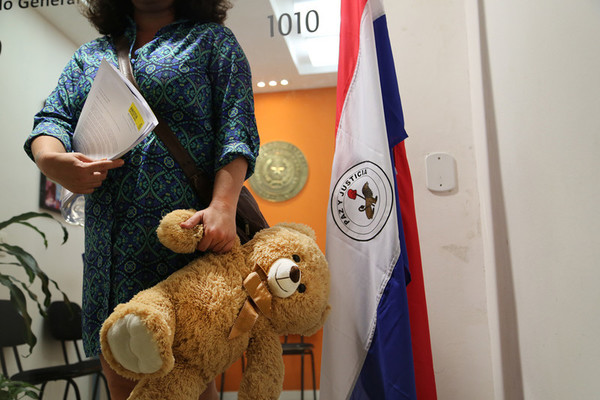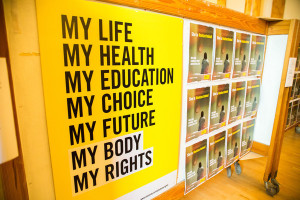
Jandira Queiroz, activism and mobilization advisor at AI Brazil at the Paraguayan consulate, Rio de Janeiro, delivering signatures for pregnant 10-year-old girs case. (Photo Credit: Anistia Internacional Brasil)
By Erika Guevara-Rosas, Americas Director at Amnesty International
It was a situation almost too heart-wrenching to comprehend. In April this year came the news from Paraguay that “Mainumby” (not her real name) then a 10-year-old girl, had become pregnant after she was repeatedly raped, allegedly by her stepfather. The girl had been taken to hospital several times in a four-month-period before the pregnancy was discovered.
After finding out the horrific news, Mainumby’s mother, whose legal complaint against her daughter’s abuser had fallen on deaf ears, made a request to the authorities to allow her daughter to have an abortion. But the government refused it, and instead moved the girl into a home for young mothers.
The reason? Paraguay, like many other countries in Latin America, has some of the world’s most restrictive abortion laws – where terminating a pregnancy is only allowed if the life of the pregnant woman is at risk. Authorities decided this case did not fall under the exception, despite the risk that a pregnancy poses to such a young girl’s physical and mental health.
Despite a global and national outcry, the authorities never budged – and last night the case came to its conclusion, as Mainumby – now 11 years old – gave birth via caesarean section. Thankfully, both the girl and the newborn appear to be in stable health condition.
The latest event in this tragic story prompted predictable triumphant cries from those who support Paraguay’s cruel stance on abortion and claim that girls this age can be mothers without risks. They say Mainumby’s case proves them right.
They could not be more mistaken.
The fact that Mainumby did not die does not excuse the absolute lack of care by the Paraguayan authorities, who simply decided to gamble with her health, life and integrity.
A long list of authoritative voices have pointed out the obvious, and possible long term, dangers to her health: the Director of the Hospital who first discovered the pregnancy; the Doctor’s Commission who subsequently assessed Mainumby’s case, relevant United Nations agencies, and the Inter-American Commission on Human Rights.
The World Health Organization has said that the risk of maternal death is four times higher among adolescents younger than 16 years than among women in their twenties. Other physical and mental health problems are also significantly higher among young girls who became mothers.
For months on end, the Paraguayan authorities chose to ignore all these facts and all the international outcry and forced Mainumby to continue with the pregnancy. They did so based on their personal convictions about abortion and on their narrow interpretation of the country’s Penal Code — which allows a legal abortion only if the life of the women is at risk. This disregards the fact that life is much more than a mere “beating heart” and that the physical and psychological consequences of carrying a pregnancy to term for such a young girl can be life-threatening in the long term.
The authorities’ appallingly cruel treatment of this 10-year-old rape victim amounts to torture. The physical and mental harm that women and girls face by forcing them to continue with a pregnancy that is a result of rape is well documented and recognized as a serious human rights violation, including by the UN Committee against Torture. Human rights standards are clear that governments should ensure access to abortion in such cases.

(Credit: Amnesty International)
Paraguay’s repressive abortion laws are rooted in ingrained discrimination against women and girls. The country’s legal system – and sectors of society– appear to view women as little more than child bearers.
The anti-abortion laws are also hitting the poorest in society the hardest. If Mainumby had come from a wealthy family, she would have had the finances to quietly get an abortion from a private clinic, or to travel abroad for one – it is unlikely the authorities would have stepped in in either case.
Unfortunately, this issue is far from being isolated to Paraguay – across Latin America, many other countries continue to place far-reaching restrictions women and girls’ ability to exercise their human rights.
This 17 August will mark the third anniversary of the death of “Esperancita,” a 16-year-old girl who was diagnosed with leukemia in the Dominican Republic and was refused immediate treatment because she was pregnant. In 2014, “Belén”, an 11-year-old girl from Chile who had become pregnant after being repeatedly raped by her stepfather was also denied any legal option to terminate her pregnancy.
Chile and the Dominican Republic are two of just a handful of countries around the world where abortion is fully criminalized. Thankfully, the Dominican Republic changed its Penal Code in December 2014, to include three exceptions to the full ban on abortion. Such reform will entry into force in December this year. Meanwhile Chile has over the past weeks taken tentative, but important, steps towards decriminalizing abortion when the pregnancy has been the result of rape, when the life of the women is at risk or when the fetus is unviable.
Mainumby is lucky to be alive – although only time will tell the true extent of the psychological consequences of her tragic ordeal. But the terrifying fact is that her story will remain all too common unless Paraguay decides to decriminalize abortion and guarantee the availability of modern contraceptives and access to information about sexual and reproductive rights for young girls.
Placing personal convictions over basic human rights will only put more lives at risk.
"Placing personal convictions over basic human rights will only put more lives at risk." I could not agree more, which is why I find it odd that this entire article does not once mention Mainumby's child. This is a undeniably a tragic situation, and I wish the best to both mother and child recovering and moving on with their lives after such a horrific episode. However, Amnesty's position in this matter would have not only subject that human being to torture, but ended its life – a clear failure on the organizations part to live up to its own original ideals. Personal convictions and political motivations aside, there is a self-evident truth that all human organisms are created equal, and that the right to life is the first and foremost in providing a free and just society.
Absolutely tragic. Words cannot describe the sadness I felt and still feel from reading this story.
twisted people. hypocrits.
Dear Amnesty USA,
you do a great work! I completely agree with you that abortion should be decriminalized in general, and the terminantion of pregnancy should be an option at hand for rape victims, in particular. I deeply regret the destiny of the girl you are talking of, I'm glad to read she was at stable health condition. I'm also glad to read that you appreciate the health of the newborn. But why not pronounce a word of hope for the newborn? I wish you a great continuation of your very important work today,
Thomas
Good comment you did!! these people are such intruders!! with terribly biassed mentality about our country laws… but Life will always avercome!!
What type of repercusions did the stepfather recieve in this particular travesty?
I think it's time that Paraguay must review the abortion law and decriminalized the abortions. Mainumby luckily alive. Why taking risks for. I must say that Paraguay immediately stop serious Human Rights violation.
Typical emotionally charged pro choice arguement. It doesn't acknowledge that the girl could have also died from or left permanently emotionally damaged by an abortion. Here we have a very positive result that will help the young mother heal physically and emotionally. Now, we have a result that won't conceal her step-father 's crime. And finally, we have an innocent life spared from the hate filled retaliation of the mother against her husband, , who is responsible for placing her daughter in harms way in the first place. Maybe the pro choices should demand castration of the step father in this case. That would do more for women's rights.
Richtige Politik in Paraguay, DAS LEBEN MUSS GESCHÜTZT WERDEN; ABTREIBUNG IST M O R D !
Rapists should be hanged immediately without any argument and further court process..
I have a really interesting experiment I'd like to try regarding a woman's right to choose. I am really passionate about and I promise if you choose to support me, the project will be in good hands. Check it out here: http://www.gofundme.com/5v37dbe9
Early miscarriages are quite common. It's dead doable to own a miscarriage before you even realise you are pregnant. regarding 1/2 all inseminated eggs are thought to be lost within the earliest days of physiological condition, before a bio assay has been done
Hey, I'm a long time fan and reader of your blog, first time commenter. Just wanted to say this post really hit home with the stuff I've been looking into. Thanks man
Thank you so much for the information you have shared with us ! I am impressed , and I would recommend this blog to my friends.
Thank you so much for the information you have shared with us ! I am impressed , and I would recommend this blog to my friends.
I have a really interesting experiment I'd like to try regarding a woman's right to choose. Thanks for your article
Thanks fpr your sharing this article. Very helpfully